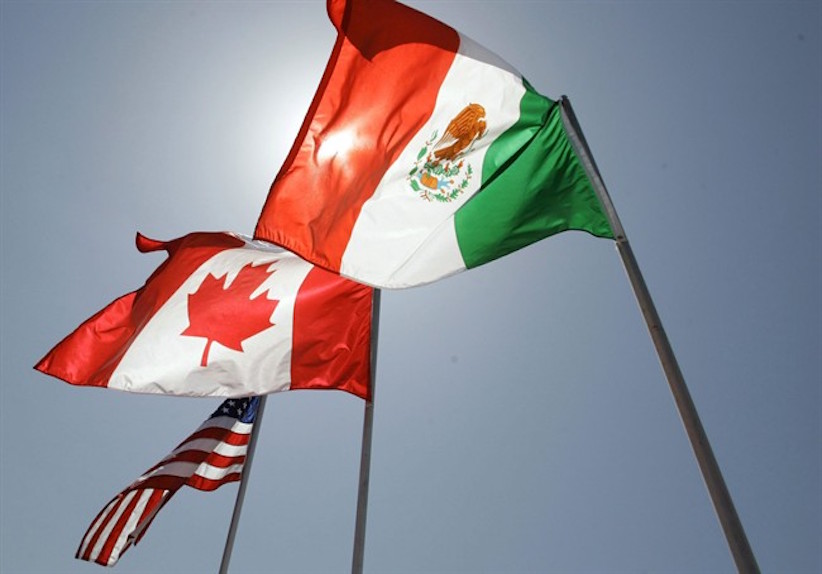Indigenous rules in NAFTA: Why one chapter is not like the others
As trade talks get going in Ottawa, the two lawyers who penned the ‘Indigenous chapter’ wait to see their unique proposal go upstairs
In this April 21, 2008 file photo, national flags of the United States, Canada, and Mexico fly in the breeze in New Orleans. Negotiations start Wednesday for an update to the quarter-century-old North American Free Trade Agreement. THE CANADIAN PRESS/AP/Judi Bottoni
Share

The proposed twenty-third chapter of the North America Free Trade Agreement is not called Chapter 23. On a bottom floor of a building on Sussex Drive, in a room designated for stakeholders, the chapter waits its turn for negotiation upstairs, where delegates from three countries converse. Its most famous peers are known as Chapter 4, Chapter 11 and Chapter 19, but the proposed chapter, lingering with its two lawyers, is distinguishably, “the Indigenous Chapter.”
“This is completely different. It doesn’t have a number,” says Michael Woods, a lawyer and member of the International Inter-tribal Trade and Investment Organization (IITIO), based in Ottawa. “We’ve already gone where nobody has ever gone before.”
As NAFTA negotiators warmed up this weekend for the third round of official talks, the hypothetical Indigenous chapter promised to become more than just another chapter in the agreement. Championed by Woods and his colleague, Wayne Garnons-Williams, the chapter would be the broadest section on Indigenous trade and labour mobility in any free trade agreement.
Just talk of the chapter has already led Indigenous business people to strategize how to modernize tribal commerce, and Woods and Garnons-Williams view it as the beginning of an economic resurgence for Indigenous groups. The Indigenous chapter may get included in NAFTA, but it holds even loftier potential.
READ MORE: America is making country of origin rules a NAFTA priority. Look out, Canada
“The introduction of the Indigenous chapter has galvanized Indigenous groups to the point where we’re on the cusp of establishing an economic Indigenous summit,” says Garnons-Williams, a lawyer from the Moosomin First Nation in Saskatchewan. His colleague Woods says such a summit would mean “bringing inter-tribal trade and the Indigenous trade into the 21st century.”
To draft a NAFTA chapter, the lawyers submitted their proposal to Global Affairs Canada on July 14, the deadline for submissions, along with more than 2,500 other stakeholders who wanted to appear at the negotiations. The Liberals had announced in November that NAFTA negotiations would re-open, and the directors at IITIO had thought, as Garnons-Williams recalls, “Oh my God, we’ve got to put something in.”
Colonialism considered, governments have a duty to permit duty-free trade for Indigenous people, the chapter proposal argues. It would allow First Nations groups to trade—for profit—resources like berries and beavers that were originally gathered or hunted using “traditional knowledge,” a concept Garnons-Williams explains with the example of pacific salmon. First Nations learned to predict the fish’s annual river run by listening for a bird to announce its arrival. “You’re river chief. How do you know this wonderful feast is coming for you?” he asks. “It’s getting closer and closer to you. The caller is the raven.”
Canada has sent about 300 delegates to the negotiations, and the Indigenous chapter will compete for table time with the controversial chapters about rules of origin (4), investment (11) and dispute resolution (19), plus other interests of the trilingual stakeholders.
The holding of stakes is shared by Gary Stordy of the Canadian Pork Council, who cares about rules of origin—“we have baby pigs. We ship baby pigs, four or five days old. They go into the United States,” he explained Saturday—and Ralph Dietrich, a vice-president of the Dairy Farmers of Canada who wants to maintain supply management. “Being in control of your destiny for any nation in terms of food is very important,” Dietrich says. Regarding the two rooms full of stakeholders, he adds, “it’s each commodity for themselves.”
Each country also fends for itself. Canada wasn’t initially included in NAFTA, which was to be a deal between Mexicans and Americans and arguably the most creative foreign policy initiative of President George H.W. Bush. In 1993, the majority whip in the House of Commons claimed, “the message from Canadians is clear: This NAFTA won’t work.”
But Brian Mulroney brought Canadians onboard, and the agreement took effect in 1994, influencing industries from peanuts to washing machines to manhole rings. Now, the Indigenous chapter waits for delegates to announce any news, the hallways outside the negotiating rooms still silent but for the echoic cluck of high heels. “We’re at the very important embryonic stage,” says Woods.
The embryo might not just grow into a series of new paragraphs in one trade agreement, but also continental return to the earliest spirit of commerce. Even the Mayans and Aztecs traded with groups of present-day Canada, notes Garnons-Williams. According to maps discovered in ancient Mexican settlements, he says, “they knew exactly where Labrador was.”
RELATED:
MORE ABOUT NAFTA:
- America is making country of origin rules a NAFTA priority. Look out, Canada.
- Will a NAFTA deal be reached by year-end?
- U.S. dairy takes aim at Canadian supply management in NAFTA talks
- Year-end deadline for new NAFTA looking impossible, experts say
- Canada’s NAFTA bid for cross-border labour mobility hits a wall
- Trudeau defends ‘progressive’ NAFTA agenda in U.S. speech
- The Bank of Canada’s anxiety over Trump and trade point to a pause for rates
- How Trump’s ‘Art of the Deal’ explains his approach to NAFTA negotiations